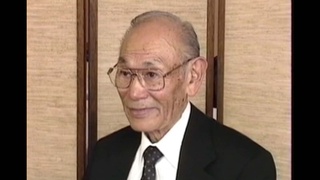Interviews
Father's business partner operated their farming business during WWII
In 1940 when the war started of course we went to camp, but fortunately Tom Bunn continued to operate the business, and my father and Tom Bunn continued to correspond back and forth by telephone by telegram while we were in the Salinas Assembly Center. And I remember Tom Bunn coming to visit us in the Relocation Camp in Salinas, Rodeo Ground, and my father would get permission to go to the camp headquarters to meet with Tom Bunn. I went with him. Tom Bunn would bring me a stick of salami and my sister a doll. I don’t know how my father communicated with Tom Bunn while we were relocated to Arizona—Poston, Arizona—but somehow they did.
Date: March 22, 2018
Location: California, US
Interviewer: John Esaki
Contributed by: Watase Media Arts Center, Japanese American National Museum









